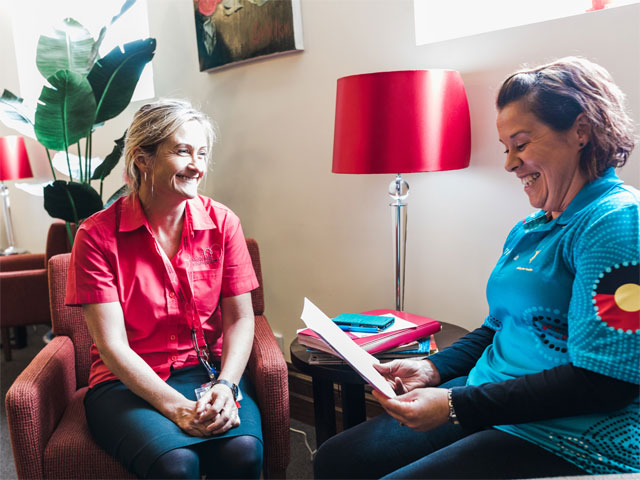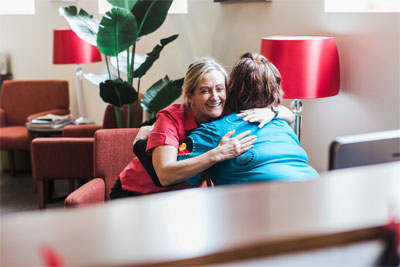Kerry Patford McGrath Foundation Interview

Over Half of Aussies Don't Talk to Anyone about a Loved One's Breast Cancer Diagnosis
Australians deal with a breast cancer diagnosis in many different ways, however the one thing we all have in common is the support required from family and friends, during what is a difficult and life changing event.
Research released today by BP Australia in support of the McGrath Foundation found that over half of people do not talk to anyone about a loved one's breast cancer diagnosis, putting their own mental and emotional health at risk.
Kerry Patford, Chief Clinical Lead at the McGrath Foundation said, "When people are diagnosed with breast cancer, it puts enormous pressure on both the individual and family. Often when we are so focused on providing physical and mental support for our loved ones, we ignore our own needs, to our own detriment," Kerry adds.
Close to one quarter of family and friends regret not reaching out for their own source of support during their loved one's breast cancer treatment, and one third wish they had have been more supportive.
"As McGrath Breast Care Nurses, part of our role is to provide support for the person who is going through breast cancer, and also their friends and family from diagnosis, through to treatment. During such an emotionally challenging time, it is often the partner, immediate family members or friends who ask the hard questions, in order to understand the full picture, in lieu of the patient undergoing treatment at the time," Kerry adds.
"This means the patient's support network really needs to practice self-care to keep up with the emotional demands of the treatment."
Looking at men, the research found that 20 per cent feel they handled their love one's diagnosis poorly by shutting down, withdrawing or remaining in a state of disbelief throughout their treatment.
Post-treatment, relationships also changed; with 16 per cent of partners noticing a shift in their loved one's body confidence, and 20 per cent admitting it took between six to twelve months to regain intimacy with their partner.
"Many partners and spouses we speak to admit intimacy with their partner is one of the biggest obstacles post breast cancer treatment. The support McGrath Breast Care Nurses provide during this time can help open up these topics for better communication," says Kerry.
As part of the emotional and physiological support McGrath Breast Care Nurses provide to thousands of people around the country, they also offer invaluable information and clarity to the partner, children, family and friends in the network.
This year, it is estimated 50 people will be diagnosed with breast cancer every day, meaning, most Australians will be connected with someone who has been affected by breast cancer.
Currently, there are 120 McGrath Foundation Breast Care Nurses in Australia supporting patients across the country, often in rural and regional areas.
A proud and longstanding partner of the McGrath Foundation, Brooke Miller, Vice President, Sales and Marketing, BP Australia says: "This year, BP is working with the McGrath Foundation to highlight how McGrath Breast Care Nurses provide vital support, not only for the person going through breast cancer, but also for their family and friends who are affected by their loved one's breast cancer diagnosis."
BP is a proud supporter of the McGrath Foundation. For more information, visit www.mcgrathfoundation.com.au
 Interview with Kerry Patford, The McGrath Foundation's Chief Clinical Lead Nurse
Interview with Kerry Patford, The McGrath Foundation's Chief Clinical Lead Nurse
Question: How do most Australians commonly react to a loved one's breast cancer diagnosis?
Kerry Patford: There is often an element of shock and disbelief when people first receive a breast cancer diagnosis. I don't think there's anything that can prepare you for hearing the words "I'm sorry, you have breast cancer" and there are so many unknowns that surround the diagnosis.
Question: What is the role of McGrath Breast Care Nurses?
Kerry Patford: We provide invaluable physical, psychological and emotional support for people experiencing breast cancer and their family and friends. McGrath Breast Care Nurses are also able to coordinate care as well as accompany people with breast cancer to medical appointments. We operate as an information resource, often simplifying treatment options to overwhelmed patients and are available to answer any questions that may arise from people diagnosed with breast cancer or their family and friends.
Question: How does a McGrath Breast Care Nurse support not only a patient but their loved ones?
Kerry Patford: We're very aware of the impact a breast cancer diagnosis can have on the person who has been diagnosed as well as their close family and friends. In reality, family and friends want to know that their loved one is getting the best possible care. McGrath Breast Care Nurses can also provide comfort and support to family and friends by acting as resource-point throughout the different treatment stages. We are also able to refer to other services that may lighten the load during the difficult times.
Question: How can we approach this topic with someone who's loved one has been recently diagnosed with breast cancer?
Kerry Patford: Many family members, men in particular, don't talk about their loved ones' breast cancer for fear of making it worse. They often feel they can't express their worries because they believe they need to take a backseat to their loved one who has been diagnosed with breast cancer. It is really important to talk as openly and honestly as possible, regardless of the difficulty as by doing nothing and not speaking about the situation, you are actually making it worse. Not acknowledging the situation can make the person with breast cancer feel more isolated and scared.
Question: What ways can Australians support their family and friends going through difficult times surrounding a breast cancer diagnosis?
Kerry Patford: It's imperative that a sense of normalcy and routine is maintained during breast cancer diagnosis and treatment. Having breast cancer is not all-encompassing and it shouldn't imbalance every part of the patient's lives or their families'. Love, support and normalcy are what most people diagnosed with breast cancer crave as they don't want to feel that they have interrupted everyone's lives. So, if the normal thing is for the kids to play football or have fish 'n' chips on a Friday night then it's important to maintain those rituals if possible.
Question: Why do men tend to withdraw or shut down after a loved one's breast cancer diagnosed and how can we change this behaviour?
Kerry Patford: Often when I talk to the family members, particularly the husbands, and point out when they're being quiet, they are prompted to open up and talk. Often their response is "I don't want to make it worse and say the wrong thing". When I acknowledge the long hours they are working, the partners often confess they're working harder and longer hours to bring in more money and relieve some of the stress from their loves ones' mind. I like to support them in that moment by reminding them that it's okay to be scared – we're all scared and being scared is very normal – "we'd be more worried if you weren't scared," I say.
Question: How can Australians support McGrath Breast Care Nurses?
Kerry Patford: To find out how you can support McGrath Breast Care Nurses or donate, please visit the McGrath Foundation website, visit www.mcgrathfoundation.com.au
Question: What do you hope to achieve from the content video showcasing the relationships between McGrath Breast Care Nurses and patients?
Kerry Patford: BP and the McGrath Foundation created the content video to showcase the wider impact breast cancer has on not just people diagnosed with breast cancer, but their close family and friends. In addition, the video brings to life the wonderful relationships McGrath Breast Care Nurses have with their patients.
Interview by Brooke Hunter
Image of Joylene Fletcher and her patient
MORE



